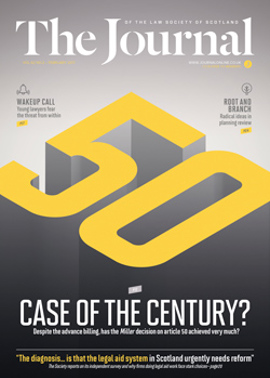One year rule becomes three

Important changes to the time limits for making a services or conduct complaint to the Scottish Legal Complaints Commission will come into force from 1 April 2017.
Over the summer of 2016, uncertainty regarding the outcome of an upcoming appeal, and the impact this might have on proposed time limit changes in relation to hybrid complaints, caused the matter to be placed on hold again. The judgment from that appeal was issued in August of last year, and our board agreed in early November to look again at the proposed rule change, taking into account the earlier consultation responses.
The new time limits
The SLCC’s board has agreed that rule 7 will be changed to extend the overall time limit for making a complaint to the SLCC from the current one year to three years.
This change will come into effect from 1 April 2017. It will only relate to complaints arising from new work which was first instructed on or after that date, or where the alleged occurrence of a specific act, omission or conviction complained of was on or after that date.
Existing provisions which allow complaints to be accepted late in certain exceptional circumstances, where there is a public interest factor, or where the complainer was excusably unaware of the complaint, will continue to apply.
The change to three years brings us closer in line to the time limits operated by other professional ombudsman-type schemes, and also addresses concerns about the number of complaints which are currently excluded because they fail to make the one-year time bar.
As part of the consultation, the Commission had also discussed a shorter six-month time limit which would run from the date a first tier complaint was closed by the solicitor. This would have required the solicitor to make it clear in writing to the complainer that they would be taking no further action on their complaint, and to provide details of how a complaint might be raised with the Commission within a maximum period of six months.
Our board considered that this aspect of the proposal was difficult to explain clearly to practitioners and clients alike. It was also considered to be unduly onerous for solicitors, who would have had to calculate in each case how much of the overall three-year period remained at the conclusion of their first tier investigation, where this was less than six months – and advise the client accordingly.
The board decided that this aspect of the proposal would not be taken forward at this time.
What does this mean for firms?
All firms will require to update their signposting information about the SLCC in their terms of engagement/terms of business in readiness for the implementation date of 1 April 2017.
The way in which firms deal with complaints will also have to be revised – internal complaints procedures and processes should be updated with the new timescales applicable for work instructed on or after that date.
Further information
Further details, including frequently asked questions and the updated version of the complete SLCC Rules effective from 1 April 2017, are available in the Rules section of the SLCC website: www.scottishlegalcomplaints.org.uk
Keeping up to date
To keep up to date with news and developments at the SLCC, including information on forthcoming CPD events, why not subscribe to our quarterly newsletter at: www.scottishlegalcomplaints.org.uk
In this issue
- Miller, Brexit and BreUK-up
- Power to the people?
- Prerogatives, Parliament and the constitution: plus ça change?
- Decisions in high places
- Reading for pleasure
- Journal magazine index 2016
- Opinion: Callum Sinclair
- Book reviews
- Profile
- President's column
- Have you heard of ScotLIS?
- People on the move
- Article 50: the final say
- Where courts fear to tread
- "Wake up": how young lawyers see the future
- How healthy is our legal aid system?
- Challenging assumptions
- Planning to deliver
- Contact and the fear factor
- And the bill goes to...?
- Pakistan to join Child Abduction Convention
- Dress to impress?
- Handcuffing of prisoners and article 3
- Turning up the heat on workplace change
- Scottish Solicitors' Discipline Tribunal
- Not just for the green welly brigade
- Five by five
- Law reform roundup
- Relief over pensions and bankruptcy ruling
- Helpline plus
- Spill the beans on legal aid fraud
- The art of bringing the good news
- Cybercrime: how are you protected?
- Ask Ash
- One year rule becomes three
- From the Brussels office






